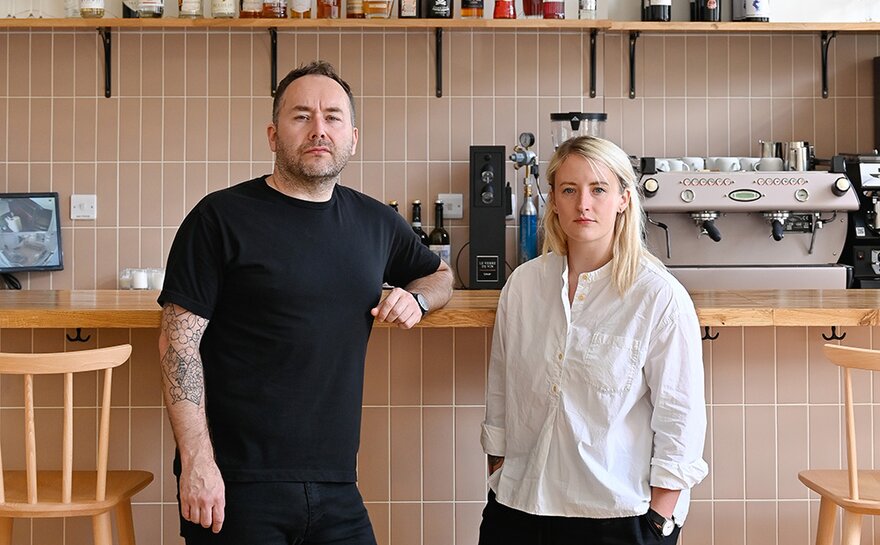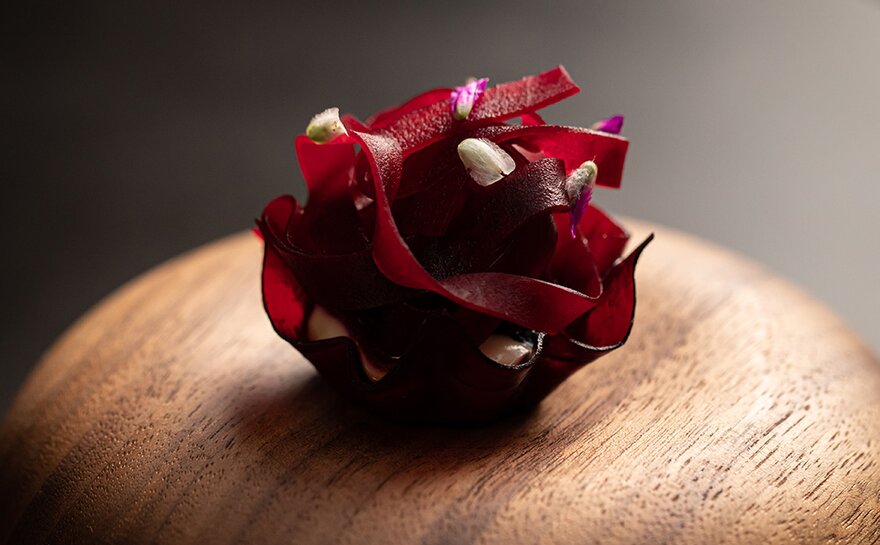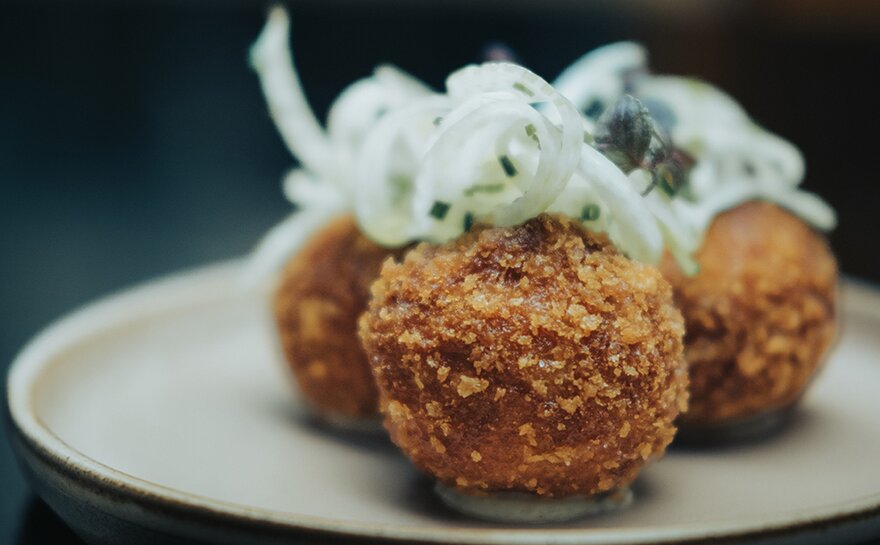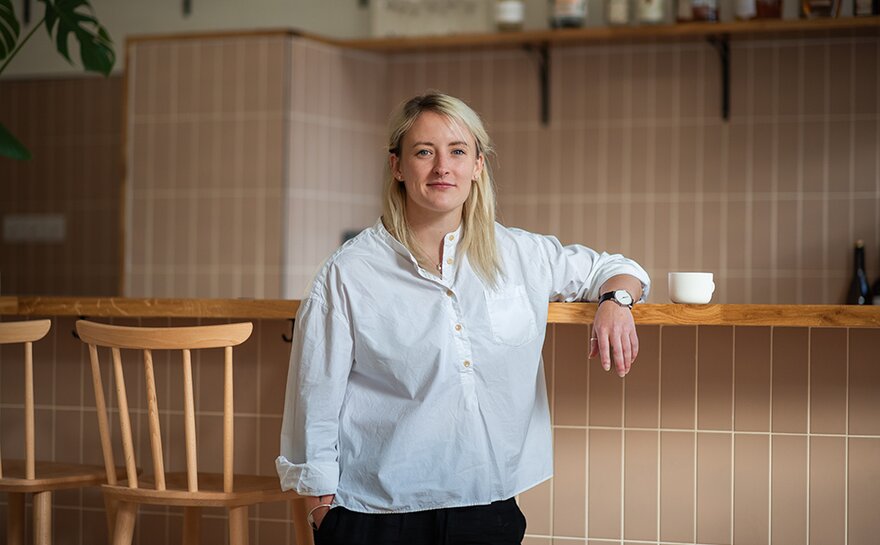Stuart Ralston's career has seen him go from Glenrothes via Gordon Ramsay to Barbados and back to Scotland. Now he's starting another chapter with Edinburgh restaurant Lyla
"Our motto has always been to undersell and over-deliver," says Stuart Ralston, chef-owner of Edinburgh restaurants Aizle, Noto and Tipo. "We've never dabbled in the luxury market before, but this new restaurant is a bit different. I'm saying from the start that it's going to be more ambitious. I think I've got the experience now to do that."
The new Edinburgh restaurant in question is Lyla, a 28-cover dining room serving a £145, 10-course tasting menu with a focus on Scottish seafood. His three other restaurants in the Scottish capital with critical and commercial successes, expectations for Lyla's October launch are as sky high as the hottest ticket at the Edinburgh Festival. Add in the fact that Lyla will open in the premises formerly occupied by 21212, the Michelin-starred dining room of chef Paul Kitching, who died unexpectedly last December, and it's arguably not just Ralston's reputation that's on the line, it's the reputation of Scottish fine dining.
Ralston is aware of the challenge and committed to doing the memory of Kitching proud. "I'm not saying I was Paul's best friend," he explains. "We talked a few times over the years and I had a lot of respect for him. The guy dedicated his whole life to this industry and was a trailblazer with his own style. I'm a fairly ambitious person and I'd hope that someone like Paul would respect what I'm doing." Ralston admits that he was always envious of 21212's premises, which he calls the best restaurant site in Edinburgh. "It sits on a quiet street beneath Calton Hill, so you can see pretty much right across Edinburgh all the way to the Firth of Forth. It's a beautiful Georgian house that represents what Edinburgh as a city is best known for. It's an ideal location for me."
Ralston is slightly reducing 21212's covers from 32 to 28, a number which will recall the original site of Aizle, where the 11 tables established Ralston's name in Edinburgh dining. Now Aizle, which moved to the Kimpton Charlotte Square hotel in Edinburgh in 2020, has 50 covers.
"I feel like if we do half those covers at Lyla, we can do things better," the chef says. "I was always looking to do a smaller restaurant again, because I enjoy cooking like that. There will be no bad table and overall it will feel personal and intimate."
What's more, Ralston will be able to see his guests from an open kitchen. That level of personal connection is more important than ever for the chef, as he says Lyla will be the final kitchen he cooks in. Yet why stop now when Lyla is likely to bring him a reputation far beyond Edinburgh dining?
"I think Lyla is the last restaurant that I'm going to feel passionate enough about to work in day-to-day rattling the pans," he says. "I turned 40 recently and I want to spend more time with my family. My eldest son is eight and my youngest son is three. I'd also like to evolve professionally through consultancies and have the opportunity to do more things abroad, which I can't if I'm in a restaurant. "Anyone who has opened higher-end restaurants knows that it takes a lot out of you. It takes a lot of commitment, a lot of time, a lot of drive, a lot of passion and a lot of money. If someone cares enough to want to know how I cook and what I do in the kitchen, then this will be the last place to see me doing that."
Scottish seafood at Lyla
The menu will have an emphasis on Scottish seafood, not only to support beleaguered producers but because it is Ralston's favourite thing to eat. It also lends itself to the small number of covers at Lyla. "I speak to people in the fish world every morning. It's a daily product which you can't pre-plan, so it suits having only 28 seats. On a larger scale it becomes more challenging when everybody is being served the same no-choice menu."
Dishes will include N25 caviar with wild bream, black radish and sea buckthorn, Isle of Skye langoustine with bonito emulsion and burgundy sorrel, and chawanmushi with razor clam and fermented white asparagus. Many dishes will be finished at the table by chefs stepping out of the open kitchen. "There'll be a bit more connection with the food and a bit more show to it," Ralston says.
There will be more to Lyla than seafood, though. Ralston expects one of the biggest hits on the menu to be a chocolate tart made with koji, the Japanese rice inoculated with a fermentation culture. "We cook the koji down with a caramelised cream and then blend it as the base of the tart with a little bit of egg yolk before baking it. It's got a unique flavour."
Meals will begin in an upstairs drawing room over canapés prepared on a chef's block. "Too often I've been to restaurants where I've been dumped in the bar and it feels like a transaction to get customers to start a tab and order more drinks," Ralston says. "And there's not really any effort to understand my likes or dislikes. We want our diners to start a conversation with the chefs about the experience they're about to have. Guests can see the chefs working and they can see the raw produce in the dry-ageing rooms before eating it downstairs in its finished form. Hopefully it will really connect people to the meal."
Ralston says that while Lyla will be the most fine-dining focused of his restaurants, he also wants it to be relaxed, and service is key to this. "The aim is to make people feel like they chose the right place to spend their money and that we care about them and their evening. It should feel like a joyful event," he says.
Ralston celebrated his 40th birthday at Frantzén, the three-Michelin-starred Stockholm restaurant of chef Björn Frantzén. "I didn't feel like I was in a, quote unquote, posh restaurant. The guy taking my wife's handbag put it on his own shoulder. It wasn't rehearsed and he wasn't scared of what he was doing – he was just being himself. You need that human touch."
Return to fine dining for Stuart Ralston
The approach at Lyla is a long way from when Ralston opened Aizle 11 years ago when he was 29. "I thought I was done with white tablecloths, fine dining and Michelin stars, so I kind of rebelled against all of that when I opened Aizle. It was a really stripped-back little restaurant, with cheap chairs and even cheaper tablecloths. I wore a T-shirt instead of a fancy chef's jacket and played loud hip hop. There were just two or three of us cooking with two pans on an old gas burner, no menu and no fine-dining theatre. Now I like to be a bit more comfortable and a bit less edgy."
Ralston had returned to Scotland after two years as chef de cuisine at Sandy Lane in Barbados, where he was responsible for the beachfront fine-dining restaurant L'Acajou. The weather, he says, was rather better than where he grew up in Glenrothes, a postwar new town in Fife, which he describes as "a little bit rough but a nice little place."
It was perhaps inevitable that Ralston would become a chef. His dad worked as a chef for the likes of the Caledonian and Gleneagles when they were part of British Transport Hotels, while his mum was a cook for schools and local councils. Money was tight and, when Ralston was 13, his dad took him to work to teach his son that if he wanted something, he needed to earn the money to buy it.
Ralston had always been drawn to American culture – not just hip hop and MTV, but basketball and other American sports – and when he heard that Gordon Ramsay was opening the London in New York, he met the chef at a cooking demo at Amaryllis in Glasgow. A stage at Angela Hartnett's restaurant at the Connaught in London led to him moving to New York when he was 22.
Ralston describes his time in the Big Apple as the most formative period of his life. "New York was tough to work in at the beginning," he admits. "I wanted to stick it out because coming from where I did, moving from Glenrothes to New York was not a normal thing to do.
"Working at that level for Gordon Ramsay was a huge eye-opener; the restaurant won two Michelin stars a year after opening. And my outlook on life just automatically started to change because of who I was meeting in New York and the type of restaurants I was eating in and all the different cultures I was experiencing in the city. My world opened up onto such a different path than what I thought was set out for me before."
From Barbados back to the Borders
In addition to working for Ramsay in New York, Ralston undertook stages with Marcus Samuelsson, Daniel Humm and Jean-Georges Vongerichten and headed up the kitchen of the members-only Core Club before returning to the UK to work for a year as head chef of Lower Slaughter Manor in the Cotswolds, just before Von Essen Hotels was sold.
A recruiter phoned to ask whether he'd like to work in Barbados – "it's not a hard sell to be offered the Sandy Lane job," Ralston laughs. He admits to loving the lifestyle not only of catering to what he calls "a small niche of extreme wealth" but also experiencing the local Caribbean culture, living on the beach with his wife and earning a good salary.
He also admits to becoming bored with the claustrophobia of life on a small island and frustrated by the lack of professional autonomy so, when his contract came up for renewal, he returned home to open Aizle on the site of a former Chinese takeaway with £25,000 in savings.
As well as winning best fine dining restaurant at the Edinburgh Restaurant Awards, Aizle was a critical hit: Zoe Williams in The Daily Telegraph called the cooking "glorious", while The Scotsman's Richard Bath saluted Ralston's "invention, innovation and sheer determination to challenge his diners' senses".
It was followed in 2019 by the US-influenced small-plates restaurant Noto, which was awarded a Michelin Bib Gourmand in 2019, and Mediterranean-inspired Tipo last year. Each operates as a standalone business, and while Ralston says he is not opening Lyla to make money, he rejects any suggestion that it is a vanity project before hanging up his chef's apron.
"I wouldn't accept having one of the restaurants losing money while the others prop it up. Lyla potentially won't be our biggest moneymaker because it has obvious overheads, but it will make money and be a healthy, profitable business. Only opening Lyla four days a week means we can condense all the bookings into those four days."
Lyla's opening will coincide with the publication of Ralston's debut book. With two years of work behind it, Catalogued Ideas and Random Thoughts has taken more than twice as long to write as Lyla has to launch, and Ralston is as proud of it as any of his restaurants.
"I didn't want it to be just a tick-box exercise where it's starters, mains and desserts from my most notable restaurant. I wanted to do something people could actually use and something that appeals to everyone from professional chefs to home cooks who lack confidence in the kitchen but want to make something simple for not much money. I wrote every single recipe in the book and I've tested them all myself. And I put a lot of effort into making sure the recipes are at an accessible price point."
The book will also tell the chef's life journey so far. "My story isn't everybody's story and I want to inspire a bit of confidence in younger chefs who want to open their own restaurant. Everybody will get something different from the book. There's a mix of random things that inspire me and practical things that I've learned." Hip hop, two pans and an old gas burner? Now that sounds like a recipe for success.
Jade Johnson, group operations director
By Rosie Conroy
For group operations director Jade Johnston the opening of Lyla is an opportunity to keep the wheels in motion and push forward both the business and the people who give it life.
"We need to be able to offer promotions," she says. "If the business stays stagnant, we're not going to have opportunities for anyone to grow. Even people like myself and Stuart need progression." It's a well-cited hurdle for hospitality businesses that many in the UK see working in restaurants as a stepping-stone rather than a job for life. Johnston's approach creates a natural ecosystem, where staff feel incentivised to stay, leading to career longevity. She's also introduced a four-day working week (this meant shutting one day a week initially, "knocking 20% of their profits on the head", but Johnston says typical hospitality hours were unsustainable), offers flexi-hours, pays competitively and in line with inflation, and she and Ralston will fund no-strings-attached training if someone puts forward a good case. She adds: "We try to make everyone genuinely happy at work.
"Staff retention is much more important and much more valuable than anything else," Johnston says. However, despite the attractive package, building the right team takes time. It's a touch point she keeps coming back to, and one of the hardest lessons of the past decade, she says, is ensuring that the fit is right. In the past she's ignored "red flags", but giving the wrong people jobs only results in having to micromanage things. The trick, she reflects, is to always trust your initial judgement and to not rush the process.
In part, Johnston credits the gradual assemblage of her staff as being key to the strength of their business model, though she adds: "If you expand too quickly, you're not going to have organically grown the team. You need to support that growth. If you grow too quickly there are going to be holes, because they're not the right people and you can only spread yourself so thinly."
Both Johnston and Ralston very deliberately spend time in all of the restaurants themselves. It's a recipe for success, but Johnston also wryly admits that they can be "annoying". She knows their precision isn't for everyone, but also knows that the people who don't care about how the napkins are folded, or how frequently guests' water is topped up, aren't for them anyway – the expected standards of their staff acts as a kind of natural filtration system.
"If you don't care and you don't naturally want to maintain our level of service, then you're going to hate working here anyway, because we're so pernickety," she says.
Continue reading
You need to be a premium member to view this. Subscribe from just 99p per week.
Already subscribed? Log In









